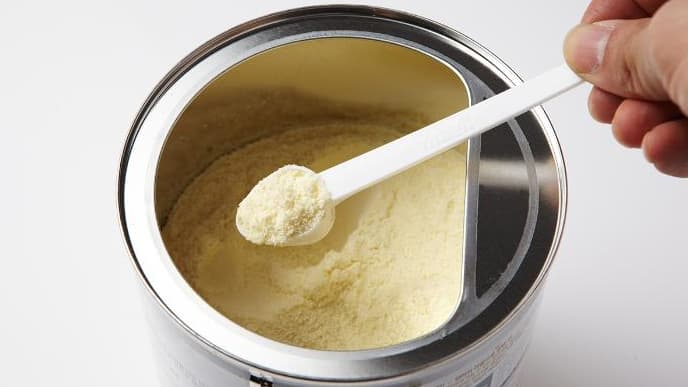Three American companies control 95% of all infant milk sales in the country.
The shortage of baby milk in the United States will last, and highlights the lack of competition that has spread to all parts of the economy, sparing no product even the most vital such as those for newborns. born.
This problem « is not going to be solved in a day or in a week », acknowledged Friday on CNN Brian Deese, the economic adviser to the White House, without being able to say how long the crisis would last.
Initially caused by supply chain issues and a lack of labor due to the pandemic, the shortage was exacerbated when in February an Abbott factory in Michigan closed after a suspected product recall of having caused the death of two babies.
Disarray
This shortage has plunged many parents into disarray and fear of losing their infants. For many families, formula milk is a necessity, particularly in modest homes where mothers, forced to return to work immediately after childbirth, cannot breastfeed. To their concern was added the rise in prices.
The US Drug Administration (FDA) cleared the milk but made « 483 observations » about the factory, Abbott said in a statement Friday.
« We immediately began implementing corrective actions and, subject to FDA approval, we could restart production at the Sturgis site within two weeks, » the company said.
For its part, the FDA has promised « to announce plans next week » which would notably allow the importation of products manufactured by foreign groups.
A few weeks?
Today, the FDA prohibits most infant milks, including those produced in Europe, not for health issues – European powdered milk is recognized for its nutritional qualities – but for labeling or packaging standards. .
“We believe these and other ongoing efforts will help significantly improve the supply in the United States within weeks,” FDA chief Robert Califf said on Twitter on Friday.
Joe Biden also spoke of « a few weeks or less » to see milk boxes reappear in numbers on the shelves.
According to him, inventory levels in stores were stabilizing this week.
Datasembly, a data provider, had revealed on Tuesday that the out-of-stock rate of infant milk formula had reached 43% at the end of last week.
« Security is paramount in this file, » insisted the White House adviser, assuring that the Biden administration was activating « all the levers » to support the supply chain.
Accused of waiting or even indifference, the White House presented a few measures on Thursday, but the scope of which seems limited.
On Friday, Joe Biden assured that his administration intervened as soon as it became aware of the problem.
« quick fix »
“The White House (…) is looking at all kinds of options to help parents, which is a good thing,” Amanda Starbuck, research director at Food & Water Watch, an activist NGO, told AFP. for safe food. « But it’s just a band-aid solution. »
She underlines how much this crisis is revealing of the problem of extreme concentration throughout the food chain.
Three American companies control 95% of all infant milk sales, she recalls.
« It’s not a problem when it comes to soda or crisps. But it is serious when it comes to essential goods like milk ».
The situation today is the result of a fundamental movement that lasted several decades.
Antitrust
And this concentration has benefited American companies which, in the absence of competition, have been able to agree on prices, deplores Amanda Starbuck.
« But companies are not the only ones to blame, » she continues, wondering why governments accept that there are only three players in this or that market.
Especially since their gigantic size does not mean that they are more efficient.
« When a single recall affects all parents across the country who need to feed their child, it’s not efficient, » she says.
The director of research urges to reverse course even if it means dismantling companies: « we must now adopt comprehensive antitrust legislation in order to better control companies, to dismantle companies which have become so big that they abuse their market power « .

